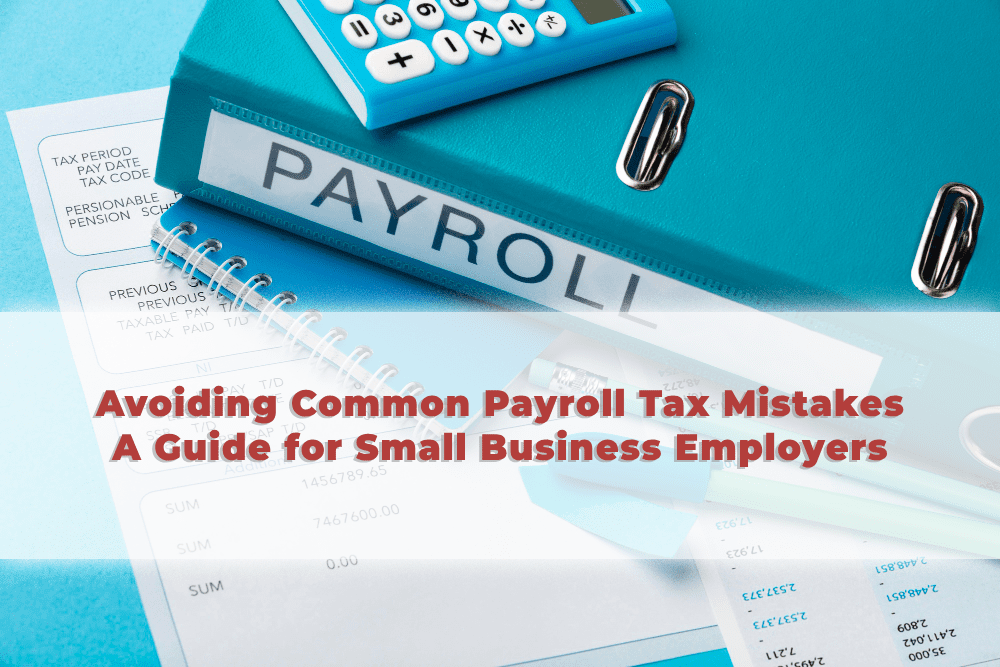Managing payroll taxes is a crucial part of running a small business, but mistakes can happen. These errors often lead to costly penalties, strained employee relationships, or even legal troubles. However, by understanding the most common payroll tax mistakes and how to avoid them, you can protect your business and ensure compliance with tax regulations.
In this blog, we’ll break down the common payroll tax mistakes small business employers face and provide simple solutions to prevent them.
1. Misclassifying Employees as Independent Contractors
One of the most frequent payroll tax mistakes is misclassifying workers. Employees and independent contractors have different tax requirements, and misclassification can lead to hefty fines.
How to Avoid It:
- Understand the IRS guidelines for employee classification.
- Use the IRS Form SS-8 to determine a worker’s status if unsure.
2. Failing to Keep Accurate Payroll Records
Incomplete or inaccurate payroll records can result in errors during tax filing. The IRS requires employers to maintain certain payroll records for at least four years.
How to Avoid It:
- Use reliable payroll software to keep records organized.
- Regularly audit your payroll records to ensure they’re up to date.
3. Missing Payroll Tax Deadlines
Missing payroll tax deadlines can result in late fees and penalties. The IRS imposes penalties starting at 2% for payments made 1-5 days late.
How to Avoid It:
- Mark tax deadlines on your calendar or use reminders in payroll software.
- Enroll in the Electronic Federal Tax Payment System (EFTPS) to schedule payments in advance.
4. Incorrect Tax Calculations
Miscalculations often occur when determining withholdings for Social Security, Medicare, or federal income taxes. These errors can lead to underpayment or overpayment.
How to Avoid It:
- Use a payroll tax calculator or software.
- Stay updated on current tax rates by visiting the IRS website.
5. Failing to Remit Payroll Taxes
Some small business owners mistakenly use withheld payroll taxes for other expenses, thinking they can pay it back later. This is a serious violation that can lead to significant penalties.
How to Avoid It:
- Open a separate bank account for payroll taxes.
- Make payroll tax payments immediately after each payroll cycle.
6. Not Providing Employees with Required Tax Forms
- Use payroll software to generate and distribute forms automatically.
- Double-check all forms for accuracy before sending them to employees.
You may also like to read:
Simplifying Payroll: How Payroll Services Transform Your Business Operations
Between managing daily operations, ensuring employee satisfaction, and keeping up with regulatory requirements,…

7. Ignoring State and Local Payroll Tax Laws
Federal payroll taxes aren’t the only taxes employers need to consider. State and local governments may have additional tax requirements.
- Research state and local tax regulations where your business operates.
- Use payroll software that includes state and local tax features.
8. Improper Handling of Employee Benefits and Deductions
Misreporting benefits such as health insurance, retirement contributions, or bonuses can lead to payroll tax mistakes.
- Work with a payroll professional to ensure all benefits and deductions are reported accurately.
9. Neglecting to Update Employee Information
Failing to update employee information like addresses or filing statuses can cause errors in tax filings and withholdings.
- Regularly review employee records and request updates.
- Use employee self-service portals for easy information updates.
10. Overlooking Tax Credits
Many small businesses fail to claim tax credits they’re eligible for, such as the Work Opportunity Tax Credit (WOTC).
- Consult with a tax professional to identify eligible credits.
- Research tax credits on the IRS Tax Credits page.




